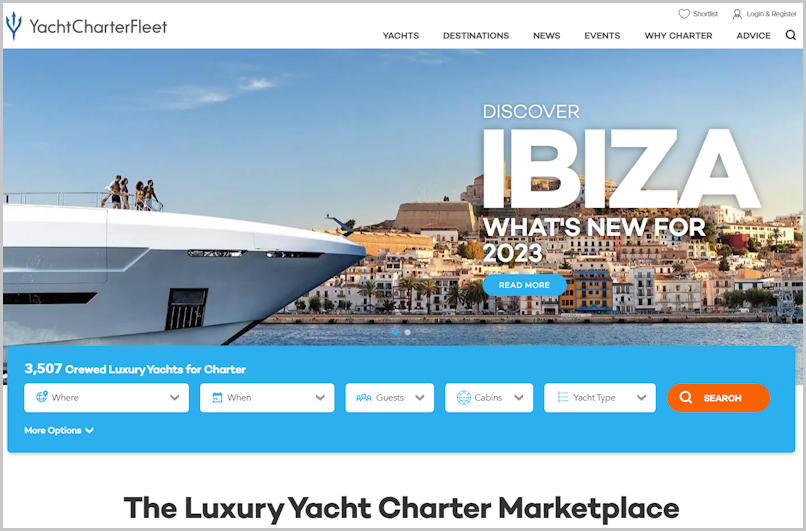Table of Contents
- The allure of a yacht vacation
- Why Charter a Yacht?
- Types of Yachts Available
- Deciding on the Ideal Charter Yacht
- Destination Choices
- Costs & Budgeting
- The Charter Process
- Customizing Your Itinerary
- Safety & Legal Considerations
- Making the Most of Your Charter Experience
- Ending Your Charter
- Beyond the First Charter: Building Relationships
The allure of a yacht vacation
Imagine waking up to the gentle lull of the sea, with a new picturesque view from your window every morning. This is the reality of a yacht vacation. The allure lies in the blend of luxury, adventure, privacy, and freedom.
- Personalized Experience: Every aspect of a yacht charter can be customized, from the destination and route to the onboard cuisine and daily activities.
- Exclusivity: Away from the throngs of traditional tourist spots, you can explore hidden gems, access private beaches, and enjoy watersports without the crowds.
- Unparalleled Luxury: Modern luxury yachts are akin to floating five-star hotels. From private cinema rooms and infinity pools to onboard spas and world-class cuisine, every whim is catered to.
- Ever-changing Views: One of the primary attractions is the dynamic nature of the vacation. Instead of staying in one place, you’re constantly on the move, offering an ever-evolving backdrop of beautiful coastlines, islands, and seascapes.
- Deep Connection with the Sea: A yacht vacation lets you establish an intimate connection with the ocean. Whether it’s watching dolphins play in the bow wave, stargazing from the deck, or just feeling the rhythm of the waves, the sea’s magic is always around you.
Why Charter a Yacht?
Unique Vacation Experience
A yacht charter is not your typical holiday. It’s an amalgamation of luxury, adventure, relaxation, and discovery, all wrapped into one. While traditional vacations might confine you to the land, a yacht voyage ensures you are in constant communion with the sea, allowing the waves to dictate the rhythms of your day. Each sunrise can bring a new horizon, a new adventure, and a new memory. From watching marine life in its natural habitat to indulging in gourmet dinners on the deck under a canopy of stars, the experiences on a yacht charter are unparalleled and unforgettable.
Privacy and Customization
In today’s world, privacy is a luxury in itself. Yacht charters provide the ultimate private escape. Away from crowded resorts and tourist traps, you have the freedom to create your own paradise on the water. The yacht becomes your secluded haven, where you set the rules and the itinerary. Whether it’s a romantic getaway, a family reunion, or a fun trip with friends, every detail, from food to daily activities, can be tailored to your preferences. Moreover, the dedicated crew ensures that every need is met, making the journey as unique and individual as its passengers.
Access to Remote and Exclusive Destinations
One of the standout benefits of chartering a yacht is the opportunity to explore untouched and often inaccessible destinations. Yachts can anchor in secluded coves, pristine lagoons, and near remote islands that are often off-limits to larger cruise ships or are too isolated for traditional travelers. This grants passengers a rare privilege: to witness the beauty of unspoiled nature, immerse in diverse cultures, and discover hidden gems of our planet. Whether it’s diving in a private coral reef, exploring a secluded beach, or visiting a tiny island village, a yacht charter unlocks doors to the world’s most exclusive spots.
Types of Yachts Available
Superyachts & Megayachts
These are the epitome of luxury at sea. Superyachts typically range from 79 feet to 200 feet in length, while megayachts exceed 200 feet. They are custom-designed floating palaces, equipped with every conceivable amenity—from cinemas and spas to onboard waterfalls and helipads. The crew-to-guest ratio on these yachts is high, ensuring a personalized and lavish service. Chartering such a yacht is not just about the journey or destination; it’s about indulging in unparalleled luxury.
Motor Yachts
These are the most commonly chartered type of luxury yachts, known for their size, speed, and stability. Motor yachts are equipped with powerful engines that allow for swift cruising from one destination to another. They often come with a wealth of onboard amenities, such as jacuzzis, gyms, and sometimes even helicopters. Ideal for those who desire a luxurious and seamless experience, motor yachts offer spacious accommodations, multiple decks, and state-of-the-art technology.
Sailing Yachts
For those who crave an authentic connection with the sea, sailing yachts are the way to go. Powered primarily by sails, these yachts offer a tranquil and eco-friendly way of navigating the waters. While they might not boast the same speed as motor yachts, sailing yachts more than compensate with their romantic ambiance, allowing passengers to truly feel the wind and waves. Modern sailing yachts often come equipped with luxury amenities and accommodations, blending tradition with comfort.
Catamarans
Catamarans are multi-hulled vessels, typically with two parallel hulls of equal size. This design offers stability, spaciousness, and a shallow draft, allowing them to access shallow waters and secluded beaches. Catamarans are known for their large living areas, both inside and out, making them perfect for families and groups. Their design also minimizes rolling, ensuring a smoother cruise.
Gulets
Originating from Turkey, gulets are traditional wooden yachts that combine the charm of classic sailing with modern comforts. Often handcrafted, these boats have a distinctive design and a rich history. Gulets usually have wide decks and spacious cabins, making them ideal for relaxed cruising, especially in the Mediterranean.
Exploration Yachts
Also known as expedition yachts, these vessels are designed for long-haul journeys and can access some of the world’s most remote destinations. Built to withstand tough conditions, exploration yachts are equipped for voyages to places like Antarctica or the Arctic Circle. They combine the robustness of a commercial vessel with the comforts of a luxury yacht, often featuring ice-classed hulls and advanced navigation systems.
Deciding on the Ideal Charter Yacht
Size and Capacity
- Purpose of the Trip: If it’s a family getaway, you may need a yacht with more cabins and child-friendly facilities. For a romantic escape, a smaller, intimate yacht might be ideal.
- Number of Guests: Ensure the yacht can comfortably accommodate all guests. Remember, while yachts have multiple cabins, not all cabins are of the same size or luxury level.
- Space Preference: Some guests prioritize expansive deck spaces for sunbathing and outdoor activities, while others may desire larger indoor salons or dining areas.
Onboard Amenities and Features (pool, cinema, gym)
- Luxury Features: For those seeking the pinnacle of luxury, features like Jacuzzis, infinity pools, and private cinemas can elevate the experience.
- Recreational Facilities: Consider what activities you’ll be engaging in. If you’re into fitness, a well-equipped gym or a paddleboard might be essential. For those who enjoy water activities, the availability of water toys like jet skis, snorkeling gear, or diving equipment might be a deciding factor.
- Tech and Connectivity: In today’s digital age, features like high-speed internet, state-of-the-art audio-visual systems, or satellite phones might be crucial for some guests.
Crew and Services Offered
- Professionalism and Experience: The crew plays a pivotal role in your charter experience. Experienced crews not only ensure safety but also provide impeccable service, local insights, and sometimes even secret anchorages or spots.
- Specialized Services: Depending on your needs, you might want crews with specific skills, such as a gourmet chef, a diving instructor, or a masseuse on board.
- Language and Communication: It might be beneficial if the crew speaks your language or if there’s a crew member who can act as a translator, especially in foreign waters.
Age and Condition of the Yacht
- Maintenance and Updates: While older yachts might have a charm of their own, it’s essential to ensure they have been regularly maintained and updated with modern amenities and safety features.
- Performance: Newer yachts might boast better fuel efficiency, speed, and technology, making the journey smoother and more enjoyable.
- Aesthetic and Comfort: Interior designs and comfort features tend to evolve. Depending on your preference, you might lean towards a yacht with contemporary design and features or one that exudes classic elegance.
Get to Know YachtCharterFleet

When it comes to chartering yachts, YachtCharterFleet offers a transparent and expansive platform for users to find and book their ideal maritime vacation.
Extensive Yacht Selection
YachtCharterFleet stands out with its vast selection of yachts available for charter. As the first independent charter comparison site, they’ve set a benchmark in presenting a complete market view to their users. By consolidating both the widely-known options and off-market yachts, YachtCharterFleet ensures users see the broadest range available.
Global Network with Local Expertise
YachtCharterFleet has built a strong global network of independent brokers, each bringing their local expertise to the table. This means when you book through them, you get connected to a broker who is familiar with the region you’re interested in. Moreover, these brokers are strategically located across different time zones and are fluent in multiple languages, ensuring smooth communication.
Personalized Vacation Packages
Beyond just connecting users with yachts, YachtCharterFleet aims to create customized vacation experiences. Their affiliated charter brokers are knowledgeable about both the yachts and their crews. This ensures that when users book through YachtCharterFleet, they get a package that aligns with their preferences and requirements.
Destination Choices
Popular Destinations for Yacht Charters
- Caribbean: A yachting paradise, the Caribbean is famed for its turquoise waters, pristine beaches, and vibrant cultures. Popular destinations include the British Virgin Islands, St. Barts, and Antigua. The archipelago offers a mix of vibrant nightlife, secluded coves, and rich marine life.
- Mediterranean: The Mediterranean Sea boasts some of the world’s most iconic yachting destinations. From the glitz and glamour of Monaco and the French Riviera to the idyllic Greek islands and the rich history of Croatia’s coastline, the region is a melting pot of cultures, cuisines, and coastlines.
- Bahamas: The Bahamas, with its 700 islands, offers a unique blend of luxury resorts and untouched nature. The Exumas, known for its swimming pigs, is particularly popular among yachters. These islands are ideal for water sports, diving, and fishing.
- South Pacific: Destinations like Fiji, Tahiti, and the Whitsunday Islands offer stunning coral reefs, clear blue waters, and a taste of Polynesian culture.
- Alaska and Nordic Regions: For those looking for an adventurous yacht charter, the cold waters of Alaska or the Nordic countries offer dramatic landscapes, wildlife sightings, and the mesmerizing Northern Lights.
Seasonal Considerations
- Peak vs. Off-Peak: While peak seasons, like summer in the Mediterranean or winter in the Caribbean, offer the best weather, they might also come with crowded anchorages and higher prices. Off-peak seasons can offer a more relaxed experience at a potentially reduced rate.
- Weather Patterns: It’s essential to be aware of regional weather patterns, such as hurricane seasons in the Caribbean (usually from June to November).
Special Events & Regattas
- Monaco Grand Prix: One of the most iconic sporting events, the Monaco Grand Prix sees the elite of the racing and yachting world converge in the tiny principality. Chartering a yacht during this event is not just about the race but also about being part of a glamorous, buzzing atmosphere.
- Cannes Film Festival: A blend of cinematic art and star-studded parties, the Cannes Film Festival is a high point on the French Riviera’s calendar. A chartered yacht offers a perfect base, allowing guests to be at the heart of the action.
- Regattas: Events like the Antigua Sailing Week or the St. Barts Bucket Regatta are a spectacle for sailing enthusiasts. Chartering a yacht during these events lets you be part of the race atmosphere, even if just as a spectator.
Costs & Budgeting
Base Charter Fee
The base charter fee refers to the cost of renting the yacht itself. This fee typically includes the use of the yacht, its equipment, and the crew’s wages. However, other expenses like fuel, dockage, and food are usually separate. The base fee can vary significantly based on factors like the yacht’s size, age, brand, and onboard amenities.
Advance Provisioning Allowance (APA)
The APA covers the variable expenses of the charter, which might not be included in the base fee. This usually encompasses:
- Fuel and water
- Port fees and dockage charges
- Food and beverages for guests
- Communications and internet charges
- Other miscellaneous expenses as required
The APA is usually calculated as a percentage of the base charter fee, typically around 20-30%, but this can vary based on the destination and the specific requirements of the charter.
At the end of the charter, there will be a reconciliation. If the expenses are less than the APA, the balance will be returned to the charterer. If the expenses exceed the APA, the charterer will be expected to cover the additional costs.
Crew Gratuity
Tipping the crew is customary in the yachting industry. While it’s at the charterer’s discretion, the standard practice is to offer a gratuity ranging from 5% to 20% of the base charter fee, depending on the service’s quality. Typically, the tip is given to the captain, who then distributes it among the crew members.
Port Fees, Local Taxes, and Other Expenses
These are the additional costs related to the yacht’s operations in different locations:
- Port Fees: Charges associated with docking the yacht in a marina or port.
- Local Taxes: Depending on the charter location, local VAT or other taxes may be applicable on the base charter fee.
- Customs and Immigration: In some regions, there might be fees associated with customs and immigration when crossing into different territories.
Insurance Considerations
- Charter Liability Insurance: This covers potential damages or liabilities incurred during the charter. Some agreements might include this in the base fee, while others might require an additional charge.
- Cancellation and Curtailment Insurance: Just like any other vacation, unforeseen events can disrupt plans. It’s advisable to have insurance that covers the costs if the charter needs to be canceled or cut short.
- Personal Travel Insurance: Apart from the charter-specific insurance, charterers should ensure they have their own travel insurance covering medical emergencies, travel disruptions, and other potential contingencies.
The Charter Process
Research and Shortlisting Yachts
- Determine Your Needs: Before diving into yacht listings, clarify what you’re looking for. Consider factors such as destination, type of yacht, desired amenities, number of guests, and budget.
- Use Reliable Platforms: Start with reputable yacht charter websites, brokers, or agencies to explore available yachts. These platforms typically provide photos, specs, and detailed descriptions of each vessel.
- Seek Recommendations: Personal recommendations from friends, family, or colleagues who have chartered yachts before can be invaluable.
Making an Inquiry
- Contact a Yacht Broker or Agent: Once you’ve shortlisted a few yachts, reach out to a professional broker or agent for more information. They can provide insights into availability, costs, and help match you with a yacht that fits your criteria.
- Ask Questions: Don’t hesitate to ask about the yacht’s history, crew experience, or any specific requirements you might have.
Charter Agreement and Terms
- Understand the Contract: The most commonly used contract in the industry is the MYBA (Mediterranean Yacht Brokers Association) Charter Agreement. This standardized contract outlines the rights and obligations of all parties.
- Key Terms: Ensure you’re clear on terms regarding cancellations, force majeure, liabilities, and any potential additional costs.
- Seek Legal Counsel: If you’re unsure about any terms, it’s wise to have the contract reviewed by legal counsel familiar with yacht charters.
Payment Schedules
- Deposits: Upon agreement, a deposit (often 50% of the total charter fee) is typically required to secure the yacht for your desired dates.
- Final Payment: The balance, including the APA (Advance Provisioning Allowance), is usually due a few weeks before the charter begins. The exact timeline will be specified in the charter agreement.
- Post-Charter Settlement: After the charter, there will be a reconciliation of the APA, where either additional payments are made or refunds are provided based on actual expenses.
Pre-charter Preference Sheet
- Personalize Your Experience: Most charter companies will provide a preference sheet for you to fill out before your voyage. This document captures your likes and dislikes, ranging from dietary requirements and preferred foods to desired activities and destinations.
- Communication is Key: Be as detailed as possible. This ensures the crew can prepare in advance, whether it’s stocking up on your favorite wine or planning a specific itinerary.
Customizing Your Itinerary
Planning Activities
- Diving: If diving is a key activity you wish to indulge in, ensure the chosen destination boasts vibrant marine life and dive sites. Some yachts come equipped with dive gear and even have certified dive instructors as part of the crew. Make sure to indicate your interest in diving in advance so necessary preparations and permissions can be obtained.
- Water Sports: From jet-skiing and paddleboarding to kite surfing and seabobbing, water sports add thrill to a yacht charter. Confirm the yacht’s equipment list and express interest in specific activities so the crew can be prepared, ensuring safety protocols are in place.
- On-shore Excursions: Explore coastal towns, historical sites, local markets, and natural wonders. Research destinations of interest or consult with the crew, who often have invaluable local insights and can recommend hidden gems.
Special Requests
- Onboard Celebrations: Celebrating a special occasion? Be it a birthday, anniversary, or engagement; inform the crew beforehand. They can help arrange everything from themed decorations and cakes to live entertainment.
- Menu Preferences: The onboard chef can cater to your culinary preferences, from regional delicacies to dietary restrictions. Detailed information provided via the pre-charter preference sheet will ensure meals are tailored to your taste.
Ensuring Seamless Transitions Between Destinations
- Route Planning: Collaborate with the captain to draft a tentative route. An experienced captain will offer guidance on the best sequence to visit destinations, considering factors like weather, sea conditions, and docking facilities.
- Flexible Itineraries: While having a planned itinerary is beneficial, one of the joys of a yacht charter is the flexibility to alter plans. If a particular spot captures your heart and you wish to stay longer, or if you hear of a nearby not-to-be-missed locale, discuss with the captain to adjust the route.
- Clearances and Permissions: The crew will handle customs clearances and permissions for docking or entering specific waters. Ensure you provide all required personal documentation in advance to facilitate smooth transitions between territories.
Safety & Legal Considerations
International Maritime Laws and Regulations
- Flag State Jurisdiction: Every yacht sails under the flag of a particular country and must adhere to that country’s maritime laws. It’s essential to be aware of these regulations, especially if they have any specific requirements for charters.
- Port State Control: When a yacht enters the waters or ports of a country different from its flag state, it must comply with the regulations of that country, which can inspect vessels for compliance with international standards.
- Charter Licenses: In many popular charter destinations, yachts are required to have a specific charter license, ensuring they adhere to local regulations and safety standards.
Crew Qualifications and Training
- Certifications: A professional yacht crew should have appropriate certifications for their respective roles. For instance, the captain should possess a master’s license, while deckhands should have basic safety training.
- Continuous Training: The yachting industry is constantly evolving, with new technologies and best practices emerging. Ensure the crew frequently updates their training to stay current.
- Experience and Expertise: Beyond certifications, the crew’s experience is vital. An experienced crew will be adept at handling various situations, from navigating challenging waters to dealing with emergencies.
Emergency Protocols and Equipment On Board
- Safety Drills: Regular drills, including fire, man-overboard, and abandon ship drills, ensure the crew is prepared for emergencies. Some charter companies might offer a brief safety drill for guests at the start of the charter to familiarize them with safety procedures.
- Safety Equipment: Check that the yacht is equipped with essential safety gear, such as lifejackets for all passengers, life rafts, fire extinguishers, EPIRBs (Emergency Position Indicating Radio Beacons), and SARTs (Search and Rescue Transponders).
- Medical Facilities: While not all yachts will have a full-fledged medical facility, they should be equipped with a well-stocked first-aid kit. In case of medical emergencies, the crew should be trained in basic first aid, and there should be protocols in place for seeking medical assistance or evacuation.
Making the Most of Your Charter Experience
Onboard Etiquette and Tips
- Shoes Off Policy: Many luxury yachts adopt a ‘shoes off’ policy to keep the interiors pristine. You might be provided with soft onboard shoes or you can simply go barefoot.
- Privacy Areas: While the yacht is at your disposal, there are specific areas designated for crew only. Respecting these boundaries ensures the crew can perform their duties efficiently.
- Safety First: Always heed the captain’s advice, especially concerning onboard safety and when it’s safe to partake in water sports or other activities.
Interacting with the Crew
- Open Communication: A harmonious charter experience is rooted in clear communication. If you have specific requirements or if something isn’t to your liking, kindly communicate your preferences.
- Respect and Courtesy: The crew works tirelessly to ensure you have a memorable experience. Treating them with respect and courtesy is essential.
- Gratuity: If you’re pleased with the service, it’s customary to leave a gratuity. While it’s at your discretion, industry norms range from 5% to 20% of the charter fee.
Enjoying the Luxury Amenities
- Explore the Yacht: From jacuzzis and onboard cinemas to gyms and game rooms, luxury yachts are filled with amenities. Ensure you take time to explore and enjoy everything on offer.
- Personalized Services: Many luxury yachts come with personal chefs, masseuses, and other specialized staff. Make the most of these services to amplify your relaxation and enjoyment.
- Water Toys: Dive into the sea using the yacht’s collection of water toys—be it jet skis, paddleboards, or underwater scooters. Always ensure safety guidelines are followed.
Respecting the Environment and Local Cultures
- Eco-Conscious Choices: Avoid using single-use plastics, ensure waste is disposed of properly, and minimize energy usage when possible. Some yachts have eco-friendly amenities such as water purification systems; make use of them.
- Local Interactions: When docking at various destinations, be mindful and respectful of local customs and traditions. Always ask for permission before taking photos of locals or private property.
- Marine Life: While diving or snorkeling, avoid touching or disturbing marine life. Coral reefs are particularly sensitive, so be cautious not to damage them with anchors or other equipment.
Ending Your Charter
Post-Charter Debrief
- Discuss with the Captain or Broker: Before disembarking, it’s a good practice to sit down with the captain or the broker to discuss how the charter went. This is an opportunity to express your satisfaction, voice any concerns, and clarify any outstanding matters, such as expenses or damage waivers.
- Finalize Expenses: If you had an Advance Provisioning Allowance (APA), there will likely be a reconciliation of expenses. This is when you’ll settle any additional costs incurred or receive a refund if the expenditures were less than the APA.
Tipping the Crew
- Recognize Their Efforts: Tipping is a customary way to acknowledge the crew’s hard work and dedication during the charter. Their relentless commitment ensures you have a memorable experience.
- How Much to Tip: As mentioned earlier, gratuities typically range from 5% to 20% of the charter fee, but this is at your discretion and should reflect your level of satisfaction. Some prefer to hand out individual envelopes, while others give a collective tip to the captain to distribute among the crew.
- Personal Notes: Along with monetary tips, a personal note expressing your gratitude can make a significant impact, letting the crew know you appreciated their efforts.
Providing Feedback and Reviews
- Constructive Feedback: Charter companies and crews continuously strive to improve their services. Providing constructive feedback can help them refine their offerings for future charters.
- Online Reviews: If you booked through an agency or a platform, consider leaving a review. Your insights will not only aid the company but also assist future charterers in making informed decisions.
- Testimonials: Positive testimonials can be invaluable to charter companies and crew. If you had an exceptional experience, consider writing a testimonial. Some companies even feature these on their websites or marketing materials.
Beyond the First Charter: Building Relationships
Benefits of Being a Repeat Client
- Loyalty Perks: Many charter companies offer discounts or special amenities for returning clients, making subsequent charters even more enticing.
- Tailored Experiences: When you’re a repeat client, the crew or the company can remember your preferences, ensuring your trips are more personalized each time.
- Smooth Process: The familiarity between you, the broker, and the crew can streamline the booking and chartering process, making subsequent trips hassle-free.
Keeping in Touch with Brokers and Crew
- Personal Connections: Over time, brokers and crew can become more than just service providers; they can become friends who genuinely understand and anticipate your yachting needs.
- Updates and Opportunities: By maintaining a connection, you can be the first to know about new yachts in the fleet, exclusive destinations, or special offers.
Exploring Different Yachts and Destinations in Subsequent Trips
- Broaden Your Horizons: Each yacht and destination offers a unique experience. By trying out different combinations, you can immerse yourself in diverse maritime adventures.
- Expert Recommendations: Leverage the insights of your trusted broker or crew from previous trips. Their recommendations can introduce you to hidden gems or yachts that match your evolving preferences.
Recapping the Magic of Yacht Vacations
Yacht charters are not just vacations; they are unparalleled experiences that blend luxury, adventure, and personalization. They offer an opportunity to explore the world’s beauty from a unique vantage point, anchored in the embrace of the sea, under the canopy of the sky.
Encouraging Sustainable and Respectful Yacht Tourism
As the allure of yacht vacations continues to grow, it’s crucial to approach them with a sense of responsibility. By making eco-conscious choices, respecting local cultures, and supporting sustainable marine practices, we can ensure that the pristine beauty of our favorite destinations remains untouched for future generations.
Embrace the luxury and freedom of yacht charters, but always set sail with respect and awareness, ensuring our seas remain as enchanting tomorrow as they are today.
Do you have any feedback or additional insights? Please send an email to editor @ yachtsurf.com





